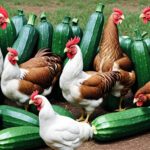Citrus fruits like oranges are a staple in human diets around the world. While we enjoy the juicy segments of these vitamin C-packed treasures, we often toss the peels without a second thought. But if you’re a backyard poultry enthusiast or an individual invested in sustainable food practices, you might ponder: can chickens eat orange peelings? This article will unravel the unpeeled truth about feeding chickens orange peelings, ensuring every scrap of your kitchen waste is utilized efficiently, and your feathered friends are receiving a diet that’s both healthy and safe.
The Fascinating World of Chicken Diets
Chickens are notorious for their voracious appetites and their willingness to peck at a diverse array of food items. To understand whether orange peelings are a safe option, it is essential firstly to delve into what constitutes a typical chicken diet.
What Do Chickens Naturally Eat?
Chickens are omnivores by nature, feasting on a variety of foods such as:
- Grains and seeds
- Insects and worms
- Green vegetables and weeds
- Fruits and berries
The Role of Treats in a Chicken’s Diet
Treats play an important role in a chicken’s life, providing both nutritional variety and enrichment. When it comes to treats, moderation is key. Treats should only make up a small percentage of their overall diet, which should be primarily composed of high-quality commercial feed to meet their nutritional needs.
Can Chickens Eat Orange Peelings: The Core Analysis
Orange peelings can be a controversial topic among poultry keepers. Let’s peel back the layers and examine the potential benefits and concerns of feeding orange peelings to chickens.
Potential Benefits of Feeding Orange Peel to Chickens
Feeding citrus peels to chickens might have some upsides, such as:
- Fiber content: Orange peels are a good source of dietary fiber, which can aid in digestion.
- Nutrient-rich: They contain vitamins and minerals, albeit in smaller amounts than the fruit’s flesh.
- Natural deworming: Some believe that the natural compounds in citrus may act as a dewormer, although scientific evidence is limited.
Concerns and Precautions When Feeding Orange Peels
Despite the potential benefits, there are valid concerns regarding feeding chickens orange peelings:
- Citrus oils and compounds: Certain substances present in citrus peels might be off-putting for chickens and can affect the taste of their eggs.
- Digestive issues: Chickens might find orange peels difficult to digest due to their tough and fibrous nature.
To Peel or Not to Peel: That is the Question
When considering whether to add orange peelings to your chickens’ snack list, it’s beneficial to weigh the pros and cons based on empirical evidence and expert insights.
Expert Opinions on Citrus and Chickens
Expert opinions vary regarding the appropriateness of feeding citrus products to chickens, with some stating that chickens naturally avoid citrus fruits in general due to their strong scent and taste.
Practical Tips for Offering Orange Peels
If you decide to offer orange peelings to your chickens, there are some best practices you should follow:
- Offer in moderation: Limit orange peels to a small portion of their diet.
- Watch for adverse reactions: Observe your chickens carefully for any signs of digestive distress.
- Cut into small pieces: To prevent choking, cut the peels into manageable sized pieces.
- Ensure variety: Always pair citrus peels with a range of other treat options.
Nutritional Breakdown: Orange Peel vs. Commercial Feed
To appreciate the value of orange peel as a treat, a comparison with the staple diet is vital. Let’s look at the nutritional makeup of orange peels vis-à-vis commercial chicken feed.
Analyzing the Vitamins and Minerals in Orange Peel
- Vitamin C: While chickens produce vitamin C naturally, an extra boost from orange peels might seem beneficial.
- Calcium and potassium: These minerals are present in orange peel and are essential for chicken health.
The Limitations of Orange Peel as a Nutritional Source
Despite containing some nutrients, orange peelings should not replace a chicken’s primary food source. Commercial feeds are specifically formulated to meet all the nutritional requirements of chickens.
Chickens’ Reception to Citrus: A Behavioral Observation
Some chicken owners report that their birds aren’t interested in citrus peels, while others notice their chickens consuming them without issue. Each flock’s behavior can inform the decision to offer orange peels.
Observing Your Flock’s Preferences
Monitor how your chickens interact with orange peelings. If they show no interest or appear repelled by the scent, it isn’t a wise choice to keep offering them.
Adjusting Treats According to Flock Behavior
A responsive poultry keeper will adjust treat offerings based on the flock’s clear preferences, ensuring they are both enjoyed and beneficial to the birds.
Orange Peels and Egg Quality: Is There a Connection?
One common concern is whether feeding chickens citrus will influence the taste and quality of their eggs. While there’s no concrete evidence, many owners decide against citrus in their chickens’ diet to avoid potential risks.
Do Citrus Peels Affect Egg Flavor?
Anecdotes suggest that a chicken’s diet can impact egg flavor, although scientific studies on citrus peels’ specific effects on egg taste are scarce.
Maintaining Optimal Egg Quality
To ensure egg quality, prioritize a balanced diet for your chickens with a minimal amount of treats, including orange peelings.
Sustainable Feeding Practices: Integrating Kitchen Scraps
Incorporating kitchen scraps like orange peels into a chicken’s diet aligns with sustainable waste reduction practices, but it should still be done carefully and thoughtfully.
Eco-friendly Chicken Feeding Options
- Composting: Use orange peels in compost, which can then enrich the soil for growing chicken-friendly plants.
- Regularity and variety: Offer a range of scraps for nutritional balance and to prevent dietary monotony.
FAQs on Feeding Chickens Orange Peelings
Let’s address some of the frequent questions related to can chickens eat orange peelings and provide succinct, informative responses.
Can Orange Peelings Harm Chickens?
While not toxic, orange peels can pose a risk if not given in appropriate amounts and sizes due to their tough texture and potent oils.
How Often Should I Feed My Chickens Orange Peelings?
Given the uncertainties surrounding orange peels, they should be provided occasionally and in small quantities, ensuring they are not a significant part of the chickens’ overall diet.
Conclusion: To Offer or Not to Offer Orange Peelings
In the quest to determine can chickens eat orange peelings, we’ve uncovered that, while not inherently harmful, there are complexities that merit consideration. Chickens can have varied reactions to citrus peels, and these should only ever be a minimal part of their diet. Always prioritize a proper balance of commercial feed and a variety of other treats to maintain your chickens’ health and happiness.
Remember, the unpeeled truth is more nuanced than a simple yes or no. Whether you choose to offer orange peelings to your chickens or not, it should be done with care, observation, and a commitment to their overall well-being.






